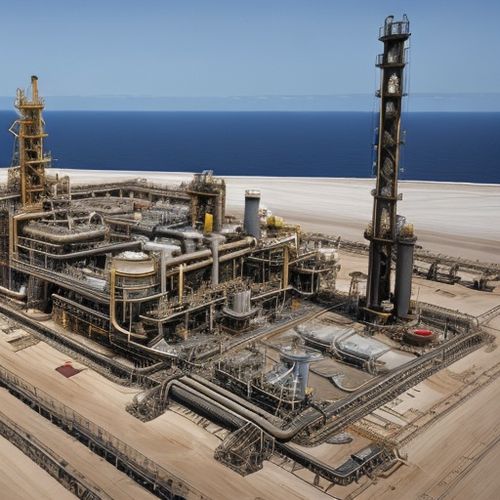In a bold and somewhat controversial move, BP, one of the world's largest energy companies, has announced a significant shift in its investment strategy. The company, which had previously pledged to aggressively transition towards renewable energy, has now decided to cut back on its planned investments in renewables and instead increase its annual spending on oil and gas to $10 billion.
This strategic pivot, aimed at boosting earnings and shareholder returns, marks a dramatic departure from BP's earlier commitments and reflects a broader trend in the energy sector as companies reassess their priorities in the face of evolving market dynamics and investor pressures.
BP's decision to scale back its renewable energy investments has sent ripples through the industry. The company had initially planned to invest heavily in energy transition businesses, with a target of spending up to $5 billion annually.
However, in a recent announcement, BP revealed that it would now invest only between $1.5 billion and $2 billion per year in these areas. This represents a reduction of more than $5 billion compared to its previous forecast. The move is part of what CEO Murray Auchincloss described as a "reset" for BP, with a renewed focus on "growing long-term shareholder value."
The shift is particularly notable given BP's history in the renewable energy space. Under the leadership of Bernard Looney, who preceded Auchincloss, BP had pledged in 2020 to cut its oil and gas output by 40% while rapidly expanding its renewable energy portfolio by 2030.
This ambitious plan was seen as a major step towards addressing climate change and aligning with global efforts to reduce carbon emissions. However, in 2023, BP lowered its oil and gas reduction target to 25%, and now, the company appears to be moving in the opposite direction altogether, aiming to grow its oil and gas production.
The decision to refocus on oil and gas is not unique to BP. Across the energy sector, major companies that had previously shifted their strategies in response to the need to lower carbon emissions are now returning their attention to fossil fuels.
This trend is partly driven by the rebound in fossil fuel prices, which have recovered from their lows during the COVID-19 pandemic. The relative ease of obtaining returns in the oil and gas sector compared to the more nascent and uncertain renewable energy market has made this shift economically attractive for many companies.
For BP, the move is also a response to investor pressures. The company has underperformed its peers in recent years, and its efforts to transition to renewable energy have not always been met with enthusiasm by investors. The situation intensified when activist investor Elliott Investment Management took a significant stake in BP, adding further pressure on the company to make transformative changes and improve its financial performance.
The strategic reset announced by BP is expected to have significant financial implications. By reallocating resources towards oil and gas, the company aims to improve its balance sheet and generate stronger returns for shareholders.
According to Allen Good, director of equity research at Morningstar, "The refocus on hydrocarbons is positive for BP, as is the overall lower spending, which is driven by lower renewable spending." Good also noted that the planned asset divestitures should further enhance the company's financial position.
BP's plans include a review of its lubricants business, Castrol, and a target of $20 billion in divestments by 2027. These moves are part of a broader effort to streamline operations and focus on core areas that offer the most significant potential for growth and profitability.
Additionally, BP has announced plans to raise its dividend by at least 4% per share annually and expects to conduct share buybacks of between $750 million and $1 billion in the first quarter. These initiatives are designed to bolster investor confidence and demonstrate the company's commitment to returning value to shareholders.
While BP's strategic shift may be seen as a pragmatic response to current market conditions and investor pressures, it also raises important questions about the company's commitment to the energy transition and climate goals.
The global push towards renewable energy and the need to reduce carbon emissions remain critical challenges, and BP's decision to cut back on renewable investments could be viewed as a setback in this broader context.
However, it is essential to recognize that the energy transition is a complex and multifaceted process. Companies like BP face the dual challenge of balancing their financial responsibilities to shareholders with their obligations to contribute to a sustainable future.
The decision to refocus on oil and gas does not necessarily mean that BP is abandoning its renewable energy efforts altogether. Instead, it may be adopting a more selective and strategic approach, as Auchincloss emphasized, investing in "innovative capital-light platforms" that offer the potential for growth and profitability while still contributing to the broader energy transition.
BP's strategic reset is a significant development in the energy sector, reflecting the complex and often conflicting pressures that companies face in the modern business environment. While the move to increase investment in oil and gas and cut back on renewable energy may be seen as a step backward by some, it is also a pragmatic response to current market realities and investor expectations.
As BP seeks to regain investor confidence and improve its financial performance, it must also navigate the broader context of the energy transition and its commitment to addressing climate change.
In the months and years ahead, BP and other energy companies will need to strike a delicate balance between short-term financial imperatives and long-term sustainability goals.
The energy transition is not a linear process, and companies will inevitably face challenges and setbacks along the way. However, by adopting a strategic and selective approach to investment, BP may be able to navigate these complexities and contribute to a more sustainable and resilient energy future. Ultimately, the success of this reset will depend on BP's ability to deliver strong financial returns while remaining committed to the broader goals of the energy transition.

By Natalie Campbell/Mar 3, 2025

By Benjamin Evans/Mar 3, 2025

By Amanda Phillips/Mar 3, 2025

By John Smith/Mar 3, 2025

By Samuel Cooper/Mar 3, 2025

By Olivia Reed/Mar 3, 2025

By Michael Brown/Mar 3, 2025

By Jessica Lee/Feb 27, 2025

By Rebecca Stewart/Feb 27, 2025

By Ryan Martin/Feb 27, 2025

By Rebecca Stewart/Feb 27, 2025

By Sophia Lewis/Feb 27, 2025

By Amanda Phillips/Feb 27, 2025

By Christopher Harris/Feb 27, 2025

By Amanda Phillips/Feb 27, 2025